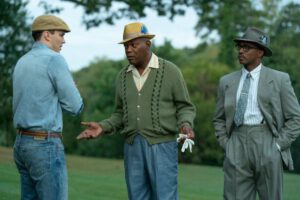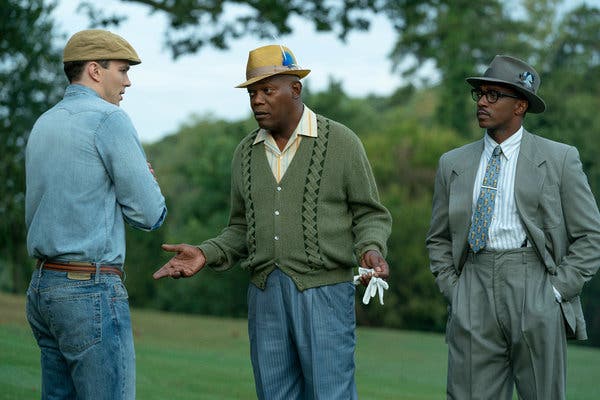Movie Info
Movie Info
- Director
- George Nolfi
- Run Time
- 2 hours
- Rating
- PG-13
VP Content Ratings
- Violence
- 0/10
- Language
- 1/10
- Sex & Nudity
- 1/10
- Star Rating
Relevant Quotes
It is well with the man who deals generously and lends, who conducts his affairs with justice.
Give to him who begs from you, and do not refuse him who would borrow from you.
The economic highway has few entrance lanes for Negroes. Nothing so vividly reveals the crushing impact of discrimination and the heritage of exclusion as the limited dimensions of Negro business in the most powerful economy in the world...

I love it that director and co-writer George Nolfi has released a Civil Rights-themed film that is new and fresh. There are no picket lines with signs “I Am a Man;” hooded KKK members gathered around a burning cross; nor do we ever hear the strains of “We Shall Overcome” or hear the prophetic voice of Dr. King. But of racism there is a plenty, and the wonder of the film is that it makes some of the intricacies of real estate and banking transactions not only understandable (almost), but suspenseful and exciting.
The film starts in Willis, Texas in the late Thirties where young shoeshine boy Bernard Garrett pays as much attention to the conversations of his white banker and businessmen customers as he does to their shoes. As soon as they leave, he jots down in his pocket notebook any business facts he has gleaned from their talk. A mathematical genius, the boy devises a series of formulas that can help determine the value of a property.
Jump to the Sixties as Bernard Garrett (Anthony Mackie) arrives in L.A. with his young wife, Eunice (Nia Long) and they scheme to enrich themselves in real estate. Through Eunice, Bernard meets nightclub owner Joe Morris (Samuel L. Jackson). The two couldn’t be more different, Joe outgoing and flamboyant, Bernard quiet and studious, his inner rage masked. “I don’t trust white people,” Joe says, and “I don’t trust black people either.” Initially repelled, Bernard comes to see that by teaming up he can fulfill his plans.
Joe reveals that he already owns a number of properties, but they are all in “Negro” neighborhoods. Bernard wants to buy properties in downtown L.A. but cannot even get an appointment with a banker. He also initially has trouble connecting with Irish businessman Patrick Barker (Colm Meaney), but by his persistence overcomes the man’s reluctance. The two blacks and Barker form a partnership that works well for a while, the three acquiring numerous buildings. But then Barker suddenly dies, and his racist widow screws them because all the signatures on the papers and deeds are her husband’s. Facing certain failure in court, the blacks are forced into a buyout by the widow of just pennies on the dollar.
They approach a young white man already working for them about fronting for them. Matt Steiner (Nicholas Hault) is taken aback. When he points out that he knows nothing about real estate, they promise to teach him the essentials of conducting the business. There follows a sequence that begins with Joe teaching the untutored man the essential business game, golf, because it’s during a golf game that white people do business. There are of course numerous humorous incidents as the inept young man murders both ball and turf, but then slowly improves. In the area of business and math Bernard takes the lead, Matt progressing even faster when he discovers that he has a talent for math (including the ability to juggle complex formulas in his head) and almost perfect recall.Matt also looks the par,t dressed up in the hand-tailored suits prepared for him by Joe’s tailor. Eunice teaches etiquette and table manners, even the proper way to eat crab legs.
The film is as fun as a caper movie when Bernard suggests that they buy L.A.’s 14-story Banker’s Building, at the time the tallest building in the city. He had been humiliated there when the loan officer declined even to meet with him. Once they control it and the bank is their tenant, they can apply more pressure to it and other banks to obtain loans. All this is great fun, with Bernard at times donning a chauffeur’s cap and hanging close to Matt in case he needs a tip or two. This Bre’er Rabbit approach to the fooling of racist whites is similar to the way in which Spike Lee’s serious but funny BlacKKKlansman did in 2018—remember the scene in which the black cop Ron Stallsworth calls up KKK leader David Duke and uses his “white voice” to fool him?
The three men grow rich in L.A., but Bernard is not content just to sit back and enjoy his wealth. He talks his partners into backing his return to Texas in order to buy the Willis bank in which he was forbidden to enter. He wants to help black businessmen and potential homeowners to have access to the capital that will lift them into the middle class. In the film’s second, part things become more complicated as now it is not just real estate but the banking business with all its abstruse Federal regulations that the three are dealing with. Also, Matt is more ambitious now and wants to have a bigger role. Overconfident because of his past success, he thinks he is ready to manage a bank, despite Bernard’s misgivings about this.
The partners do manage to buy the Mainland Bank of Willis, but a racist official there becomes suspicious when he goes over the lists of new loans and notes that most of their new customers are blacks. The three manage to buy another bank in a nearby town and shift loans to it, but then the Feds are called in, and Matt finds himself over his head, ignorant of the arcane regulations that he has violated. Not even his two partners dressed as servants and holed up in the bathroom, to which he dashes with files that he cannot explain, can save him from the keen-eyed bank examiner sent to scrutinize his books.
Soon the three are arrested, and Bernard Garrett is being grilled before a Congressional financial committee.
Although they lose much of their holdings, the two African Americans emerge from prison with some of their wealth having been hidden away. Matt himself, we are told in a series of end titles, was never prosecuted.
From what I have been able to read, this “true story” is very fictionalized—there is no mention of Bernard Garrett’s divorce from Eunice that took place within the time frame of the film nor of his new wife. Also clouding the picture a bit is the delay of the release of the film because of a charge of sexual abuse against the son Bernard Garrett, Jr., who served as one of the film’s producers. Garrett Jr. has denied the claims, but Sony has removed his name from the credits during the delay. Initially scheduled to premiere Nov. 20 at the AFI Fest before a December 2019 theatrical opening, it is now streaming today—March 20–on The Apple TV+.
Despite this, I recommend the film because of its unique contribution to our knowledge of some of the “hidden figures” of the Civil Rights era who fought the less glamorous fight for racial equality in the real estate and banking businesses. Martin Luther King, Jr. taught that equality was crucial in finance and real estate if ever his dream of the Beloved Community were to be brought into being. The Fair Housing Act of 1968 that resulted from the struggle of Bernard Barret Sr. and Joe Morris has not fixed all of the problems blocking the that dream, but it did move our nation a step closer–this film helps us appreciate this.
The people at IMDB must have screened a longer version (2:23) because it came to just two hours when I screened it.
This review will be in the February issue of VP along with a set of questions for reflection and/or discussion. If you have found reviews on this site helpful, please consider purchasing a subscription or individual issue in The Store.

